Bethan:
(Heide) I don't know if we've ever had such a successful discussion
here as we seem to be having with Nostromo. Why is that?
Nostromo is flawed, but it isn't shallow. At least it's trying to say
something about the human condition.
(Heide) That's what I like best about Charles—he knows just what
to do (except doing poor Emilia)
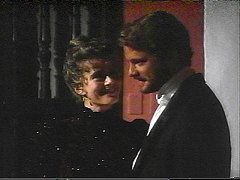 I
found myself wishing there were more scenes between Charles and Emilia.
I think Emilia continues to love Charles (and he her), but she is deeply
saddened by the loss of passion or the transfer of it to the mine. In the
book and the beginning of the film, it is very clear that there is a strong
physical bond between them. They both find each other very attractive. I
found myself wishing there were more scenes between Charles and Emilia.
I think Emilia continues to love Charles (and he her), but she is deeply
saddened by the loss of passion or the transfer of it to the mine. In the
book and the beginning of the film, it is very clear that there is a strong
physical bond between them. They both find each other very attractive.
(Heide) Does he fight effectively with Montero? How do we compare
his fighting technique with, say, A Thousand Acres or others?
I don't think Charles was used to physical combat. I mean, he's bigger
than Montero! As to CF's technique elsewhere, I can only recall The Advocate,
when Courtois punches someone and then rubs his hand. I don't think CF
is into macho roles. I wonder if he takes a stand on gratuitously violent
roles? He never appears in them. A missionary-influenced upbringing perhaps?
Kate:
(Bethan) I wonder if he takes a stand on gratuitously violent roles?
Didn't he say somewhere that he would have a problem if a child of
his wanted to join the army?
Karen:
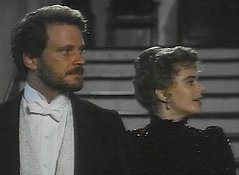 (Bethan)
I think Emilia continues to love Charles (and he her), but she is deeply
saddened by the loss of passion or the transfer of it to the mine. (Bethan)
I think Emilia continues to love Charles (and he her), but she is deeply
saddened by the loss of passion or the transfer of it to the mine.
Agreed, they still love one another, but Charles just has no time for
Emilia. He is obsessed with the mine and neglects her as a result. Initially
though Emilia appears to be as caught up with the mine until she realizes
that it alone will not change the corrupt ways of the country.
(Bethan) In the book and the beginning of the film, it is very clear
that there is a strong physical bond between them. They both find each
other very attractive.
I too noticed a few sections in Part I of the book where that physical
attraction is described as follows:
Then, surprised by her husband's silence, she raised her eyes,
opened wide, as pretty as pale flowers. He had done his spurs, and, twisting
his mustache with both hands, horizontally, he contemplated her from the
height of his long legs with a visible appreciation of her outward appearance.
The consciousness of being thus contemplated pleased Mrs. Gould. [...]
Mrs. Gould, frowning, surveyed him from head to foot. With his riding
breeches, leather leggings...a Norfolk coat of gray flannel, and those
great flaming mustaches, he suggested an officer of cavalry turned gentleman
farmer. This combination was gratifying to Mrs. Gould's tastes...
Re: John the Baptist
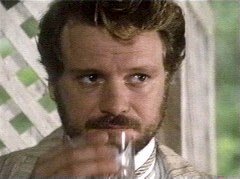 I
must not have phrased my inquiry clearly. I was just wondering if anyone
noticed anything about Nostromo to suggest a parallel to the life of John
the Baptist. All I know is that John the Baptist was a martyr (?). However,
I see nothing of a martyr in the actions of Nostromo. The Viola family
continues to call him Gian Battista throughout. Do they think he is a martyr
to the European powers in charge? Or is it meant to be ironic? Nostromo's
last name is Fidanza, which means fidelity or loyalty. However, Nostromo
is not really loyal to anyone—not even himself. He betrays his good name,
Charles and Captain Mitchell, and most importantly the Viola family. I
must not have phrased my inquiry clearly. I was just wondering if anyone
noticed anything about Nostromo to suggest a parallel to the life of John
the Baptist. All I know is that John the Baptist was a martyr (?). However,
I see nothing of a martyr in the actions of Nostromo. The Viola family
continues to call him Gian Battista throughout. Do they think he is a martyr
to the European powers in charge? Or is it meant to be ironic? Nostromo's
last name is Fidanza, which means fidelity or loyalty. However, Nostromo
is not really loyal to anyone—not even himself. He betrays his good name,
Charles and Captain Mitchell, and most importantly the Viola family.
So, if this explanation helps, does anyone see a tie-in?
Arami:
(Karen) The Viola family continues to call him Gian Battista throughout
That's because, notwithstanding any deliberate or coincidental allegory,
as the case may be, Gian Battista is supposed to represent his actual Latin
American Christian (=baptismal; given; first) name.
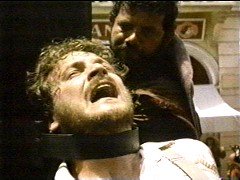 Heide: Heide:
I'd be interested in knowing if Conrad intentionally chose Gian Battista
for Nostromo's Christian name. If he did, I would imagine it's meant to
be ironic. Saintly, martyred, dying for his ideals. Nostromo's image appears
noble and good but he is anything but that. Actually, he is more of a victim
of his own image. Of course, this could all be bullsheet too! :-)
Arami:
(Heide) I'd be interested in knowing if Conrad intentionally chose
Gian Battista for Nostromo's Christian name.
I've read a bit about Conrad and do not recall any evidence of his
intentional manipulation of characters' names.
Gi:
Arami, on the issue of given names, yours seems a very sensible approach.
If you cannot find any allegory, then probably there is none.
Evelyn:
(Gi) If you cannot find any allegory, then probably there is none
Perhaps the allegory is not in the name itself, but the person whose
name it is. I do not know much about John the Baptist, but features of
his life might be similar to Nostromo's.
My book notes says that the name Gould suggests gold and Costaguana
comes from Costa Rica and guano (manure). My notes (written by Martin Seymour-Smith)
do not mention Gian Battista.
One can say Conrad was pretty tricky!
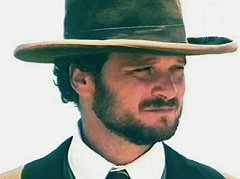 Arami: Arami:
(Evelyn) but features of his [John the Baptist's] life might be
similar to Nostromo's.
One thing is certain: John the Baptist didn't steal a load of silver.
The tragedy of Nostromo is his fall as an honest man. How can we talk about
a parallel with a Biblical martyr?
Evelyn:
(Arami) John the Baptist didn't steal a load of silver
That's for sure, but Nostromo started out as an idealist, an honest
man, faithful to his country and his friends. Only at the end was he corrupted.
Gi:
John the Baptist was an older cousin of Jesus, born when his parents
were already too old to have children. In adult life John became a famous
prophet. He said that the Messiah was coming soon to Israel. He poured
water over people's heads to symbolically cleanse them of their sins. When
Jesus grew up, he visited John and asked to be baptised. John, however,
hailed him as the Messiah and said that it was he, Jesus, who should cleanse
him, John. In the end he let himself be convinced to baptise Jesus.
After that we only hear about him because King Herod's wife bore him
some grudge and, when the king promised his daughter Salome anything she
wanted after she danced especially well, Salome, by her mother's wish,
asked for John's head and so the Baptist was beheaded.
Karen:
A summary of a long article found by Evelyn:
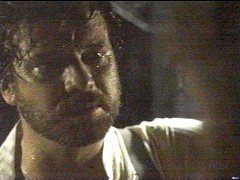 "An
Epic Fight for Survival" by Nicholas Hellen describes the 10-year effort
involved to film Nostromo. When the BBC originally considered it in the
mid-1980s, "costume drama was at a low ebb. It concluded that the subject
was simply too big." David Lean then became interested in making a big-screen
version, but six weeks prior to shooting in 1991, Lean died, and his scriptwriter
said: "There seems little likelihood that anyone will be tempted to invest
$30m in a story whose essential point is that money is the root of all
evil." "An
Epic Fight for Survival" by Nicholas Hellen describes the 10-year effort
involved to film Nostromo. When the BBC originally considered it in the
mid-1980s, "costume drama was at a low ebb. It concluded that the subject
was simply too big." David Lean then became interested in making a big-screen
version, but six weeks prior to shooting in 1991, Lean died, and his scriptwriter
said: "There seems little likelihood that anyone will be tempted to invest
$30m in a story whose essential point is that money is the root of all
evil."
When the BBC revisited it in the 1990s, the focus was on "frock flicks"
or "adaptations of novels with romantic story lines that can be given a
contemporary edge by accentuating their insights into the battle between
the sexes. Jane Austen and the Brontës are apparently required reading
in the BBC drama department." Nostromo did not fall into this category
as "the story is complicated and what love interest there is is fraught
with compromise and disillusionment. The relationship between the English
characters, Gould and his wife, Emilia, offers little emotional depth."
Another perceived deterrent to ratings success in Britain was that the
title character had to be played by an Italian.
The novel, although considered by Conrad to his "greatest and most difficult
achievement," was not well-received at the time, and Conrad today is perhaps
the least read great novelist in Britain. While compared to War and Peace,
"Conrad's novel is ironic and stark where Tolstoy's is triumphal and heroic."
When he finished it, Conrad wrote: "I've finished. There's no elation.
No relief even." The Times Literary Supplement declared it "an artistic
mistake." Conrad noted that the readers of the magazine serialisation complained
"of so much space being taken by utterly unreadable stuff."
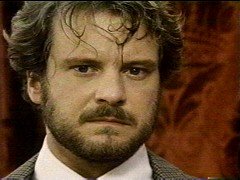 In
1992, Fernando Ghia approached Michael Wearing, a BBC producer, who put
his reputation behind the project. He "was attracted by the epic sweep
of the book and saw it as fundamentally different to Rhodes. 'Rhodes was
a drama documentary; this is an allegorical novel....It is one of those
stories showing elements of the human condition on a grand scale.'" In
1992, Fernando Ghia approached Michael Wearing, a BBC producer, who put
his reputation behind the project. He "was attracted by the epic sweep
of the book and saw it as fundamentally different to Rhodes. 'Rhodes was
a drama documentary; this is an allegorical novel....It is one of those
stories showing elements of the human condition on a grand scale.'"
Financing turned the project into a "Europudding—a joint venture with
producers divided by language and culture....Nostromo was too big for the
BBC to tackle on its own." The funding diversity shows in the casting,
and "British viewers will notice the compromises. Italian actor speaks
to Italian actress in heavily accented English....Nostromo is taken by
the Italian actor, Claudio Amendola, and Decoud by a French-Canadian, Lothaire
Bluteau. The Goulds are played by Colin Firth and Serena Scott Thomas,
with Albert Finney appearing as the disillusioned, alcoholic Dr. Monygham.
As Darcy in Pride and Prejudice, Firth made millions swoon. But the role
of Gould calls for an unattractive beard and the silver mine as his only
true passion, if also the setting for a loveless coupling with his wife.
The only romance involving Firth took place off-screen. During filming
he split with Jennifer Ehle, his co-star in Pride and Prejudice, and fell
in love with Livia Giuggioli, an Italian production assistant."
After four months, the difficulties associated with the location and
climate came to a climax as the director Alastair Reid had to be hospitalized
"after losing consciousness. For months he had spurred himself on with
heavy doses of energy-giving glucose. His body had finally refused to cooperate."
On one night's shoot, Serena Scott Thomas called the hospital for direction.
"The tension was palpable. Michael Wearing...admits now that at that point
he began to fear the £10 production might have to be abandoned....Filming
was only eight days from completion, but a stoppage could wreck a venture
that had already taken 10 years to reach this stage. Reid took the call,
and for two days resumed command from his sick bed."
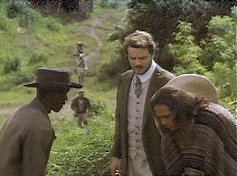 "The
production seemed to be cursed by bad luck from the start. Ghia thought
he had come forearmed against disasters by securing the personal blessing
of the president of Colombia and being able to enlist 15,000 Arhuaco Indians
as extras." Despite this, there were pay disputes, noisy political demonstrations,
set construction disasters and bad publicity over environmental issues
(destruction of some rainforest on the edge of Cartageña's botanical
gardens). There were also fears of sabotage by disgruntled crew. The weather
was of course a major factor. "Unwelcome breaks caused by the frequent
downpours became routine....The heat and humidity were overpowering. A
video diary kept by Reid shows Firth struggling into his period costume,
saying: `You have to have a masochistic delight in sweating and suffering.
The Brits love this stuff more than anybody. It is the Italians and the
Spanish who complain about it.'" "The
production seemed to be cursed by bad luck from the start. Ghia thought
he had come forearmed against disasters by securing the personal blessing
of the president of Colombia and being able to enlist 15,000 Arhuaco Indians
as extras." Despite this, there were pay disputes, noisy political demonstrations,
set construction disasters and bad publicity over environmental issues
(destruction of some rainforest on the edge of Cartageña's botanical
gardens). There were also fears of sabotage by disgruntled crew. The weather
was of course a major factor. "Unwelcome breaks caused by the frequent
downpours became routine....The heat and humidity were overpowering. A
video diary kept by Reid shows Firth struggling into his period costume,
saying: `You have to have a masochistic delight in sweating and suffering.
The Brits love this stuff more than anybody. It is the Italians and the
Spanish who complain about it.'"
"Unsurprisingly, a dark humour gripped the film-makers. In the claustrophobic
jungle, the father of Charles Gould is murdered with an axe by the Indian
slaves. The victim is played by Wearing. In a later scene, a group of men
were required to be executed by a firing squad. Reid gleefully lined up
almost the entire production team."
 Hellen's
own review: "If audiences can survive the second and weakest of the four
90-minute episodes, it should prove a hit....Nostromo not only looks good,
the story is well paced and the performances much stronger. Finney is particularly
fine, and, while Firth seems muted as a man in the grip of an obsession,
Scott Thomas makes much of what could have been a slight role." Hellen's
own review: "If audiences can survive the second and weakest of the four
90-minute episodes, it should prove a hit....Nostromo not only looks good,
the story is well paced and the performances much stronger. Finney is particularly
fine, and, while Firth seems muted as a man in the grip of an obsession,
Scott Thomas makes much of what could have been a slight role."
According to the article, Lean's collaborators had resurrected plans
to make a feature film version that would be directed by Hugh Hudson. The
producer, Serge Silberman, expected to began shooting within a year.
Bethan:
There was also another quite long article about Nostromo in the Sunday
Observer. It was a favourable article, praising the intrinsic value of
the project and the performances, but stating that its worth would not
be reflected in the viewing figures, i.e., it was unlikely to be popular
viewing.
Funnily enough, I saw a comment by Michael Wearing just the other day.
He said that a drama about the impact of industrialisation in the 19th
century on a Third World country just wouldn't have mass appeal, unlike
P&P (for which he was also executive producer) which was all about
gender politics.
Evelyn:
a feature film version that would be directed by Hugh Hudson
My thought when I read this was, if BBC with six hours couldn't make
the book's plot logical and seamless, can you imagine what a movie in two
hours will do!
Karen:
(Arami) The tragedy of Nostromo is his fall as an honest man.
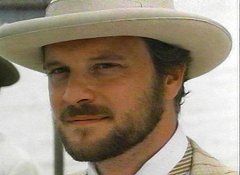 Nostromo
is neither honest nor dishonest. He is a "natural" man as is discussed
in most of the lit crit. He has no ideals; he is amoral. He exists for
himself, his good name, his vanity. There is no good or bad, honest or
dishonest in his fundamental world. He just *is*. His fall is most often
described as the original Fall of Man, i.e., Adam's fall. He awakens to
the "knowledge of good and evil that is said to have corrupted the first
man in Eden....Gould is not God—or the devil—dealing out the choice, or
tempting the man. He is Nostromo's double as well as the initiator of his
fall. That is to say, Gould's corruption is the model for Nostromo's, and
Gould himself is an Adam, disturbing creation in the 'paradise of snakes'
where the mine slept until he resolved to use it for human salvation. Evil
(one cannot tell about good, since there's very little of it in the novel)
is exterior and is not, even, moral. The evil is the silver." (Hay, pp.182-3) Nostromo
is neither honest nor dishonest. He is a "natural" man as is discussed
in most of the lit crit. He has no ideals; he is amoral. He exists for
himself, his good name, his vanity. There is no good or bad, honest or
dishonest in his fundamental world. He just *is*. His fall is most often
described as the original Fall of Man, i.e., Adam's fall. He awakens to
the "knowledge of good and evil that is said to have corrupted the first
man in Eden....Gould is not God—or the devil—dealing out the choice, or
tempting the man. He is Nostromo's double as well as the initiator of his
fall. That is to say, Gould's corruption is the model for Nostromo's, and
Gould himself is an Adam, disturbing creation in the 'paradise of snakes'
where the mine slept until he resolved to use it for human salvation. Evil
(one cannot tell about good, since there's very little of it in the novel)
is exterior and is not, even, moral. The evil is the silver." (Hay, pp.182-3)
(Arami) How can we talk about a parallel with a Biblical martyr?
By the mere fact that Conrad gave his title character that name. Naming
characters is not a haphazard exercise for some authors. Conrad borrowed
extensively from several sources for the names of most of his major and
minor characters, situations and scenery. They are: Edward B. Eastwick's
Venezuela
(1868), which was in Conrad's library when he died; G. F. Masterman's Seven
Eventful Years in Paraguay (1870); and S. Perez Triana's Down the
Orinoco (1902).
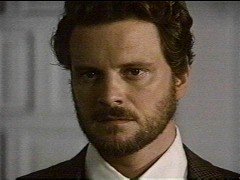 In
The
Political Novels of Joseph Conrad by Eloise Knapp Hay, which I have
quoted above, the real sources of the characters' names are discussed at
some length. Another author, Albert J. Guerard, in Conrad the Novelist
notes how Conrad subtly juxtaposes the figure of Charles Gould on horseback
and the equestrian statue of Charles IV of Spain. In
The
Political Novels of Joseph Conrad by Eloise Knapp Hay, which I have
quoted above, the real sources of the characters' names are discussed at
some length. Another author, Albert J. Guerard, in Conrad the Novelist
notes how Conrad subtly juxtaposes the figure of Charles Gould on horseback
and the equestrian statue of Charles IV of Spain.
I believe he chose John the Baptist's name in the same way as he chose
the last name of Fidanza. Both are literary devices and he uses them symbolically
and ironically. Conrad, while an avowed atheist, was respectful of his
upbringing. He did not use the name in an irreverent way. In the same way,
I hope no one will take offense at my own conclusions because no disrespect
is intended.
John the Baptist is an agent in the process of saving souls. When Nostromo
assumes his real name, he has saved the mine and lost his own soul. After
burying the silver on the island, he comes to the realization that he has
been betrayed by the Europeans and that both Giorgio and Teresa were right.
"The decision is based on a moral bargain: he has bought the treasure with
his own soul, forfeited when he betrayed Decoud and Teresa to save it."
(Hay, p.205)
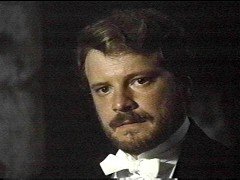 According
to Conrad: "Nostromo had lost his peace; the genuineness of all his qualities
was destroyed. He felt it himself, and often cursed the silver of San Tomé.
His courage, his magnificence, his leisure, his work, everything was as
before, only everything was a sham." He is described later as "the man
whose soul was dead within him." When material interests are put before
humanity, all have lost their souls: Gould, Decoud and now Nostromo. At
the end, I think there is some ambiguity whether his attempt at repentance
is successful. According
to Conrad: "Nostromo had lost his peace; the genuineness of all his qualities
was destroyed. He felt it himself, and often cursed the silver of San Tomé.
His courage, his magnificence, his leisure, his work, everything was as
before, only everything was a sham." He is described later as "the man
whose soul was dead within him." When material interests are put before
humanity, all have lost their souls: Gould, Decoud and now Nostromo. At
the end, I think there is some ambiguity whether his attempt at repentance
is successful.
But then again, Nostromo may be no different than Moby Dick (a fish
story) or Grapes of Wrath (about migrant workers) or East of Eden (about
lettuce). Like Heide said earlier, this could all be bullsheet! ;-)
Now a subject on which there can be no disagreement. Could they have
picked an uglier woman to play Antonia?
Bethan:
Antonia should have been beautiful—not well cast, I'm afraid. She was
modeled on Conrad's first love.
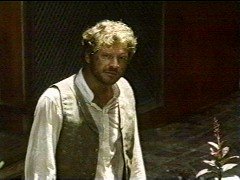 Question,
what colour is Colin's hair, really? In some shots he looked almost blonde,
but when kissing Emilia's hand at the harbourside ("God willing, never
without you!") his hair looks reddish. Ditto in the scene when he and Emilia
meet the new president in the palace after the political upheaval. Highlights
brought out by the sun? And he always looks so clean, almost schoolboyish,
particularly in that white Eton collar. I think I prefer him slightly rumpled! Question,
what colour is Colin's hair, really? In some shots he looked almost blonde,
but when kissing Emilia's hand at the harbourside ("God willing, never
without you!") his hair looks reddish. Ditto in the scene when he and Emilia
meet the new president in the palace after the political upheaval. Highlights
brought out by the sun? And he always looks so clean, almost schoolboyish,
particularly in that white Eton collar. I think I prefer him slightly rumpled!
Ann:
Gould's hair is supposed to be red, so maybe they were going for a
strawberry blonde look?
Arami:
"Nostromo's corruption...Deprived of reputation, Nostromo seeks compensation
in wealth...Like Gould, Nostromo pins his faith on materialism in order
to compensate for his loss of prestige...The central tragedy of "Nostromo"
is incompatibility of material interests and moral principles..." (from
Joseph
Conrad, A Biography by Jeffrey Meyers)
Heide:
I read both texts cited above and find them complementary to each other.
A fitting conclusion to the debate.
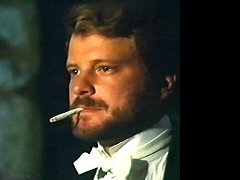 I
did find Conrad's reference to "the beautiful Antonia" amusing. She would
be the only reason he would return to (fictional) Sulaco. In your dreams,
Joe. I
did find Conrad's reference to "the beautiful Antonia" amusing. She would
be the only reason he would return to (fictional) Sulaco. In your dreams,
Joe.
Arami:
I've found an interview in which he says that he used to be blonde
as a child. He is now presumed light brown with fair reddish highlights,
but one can never be sure, and colour hair rinses seem temptingly easy
to apply.
Bethan:
I think light to chestnut brown with fair reddish highlights is a pretty
accurate description! I don't think it was lightened for Nostromo, more
likely naturally bleached by five months in the sun. |
 I
must not have phrased my inquiry clearly. I was just wondering if anyone
noticed anything about Nostromo to suggest a parallel to the life of John
the Baptist. All I know is that John the Baptist was a martyr (?). However,
I see nothing of a martyr in the actions of Nostromo. The Viola family
continues to call him Gian Battista throughout. Do they think he is a martyr
to the European powers in charge? Or is it meant to be ironic? Nostromo's
last name is Fidanza, which means fidelity or loyalty. However, Nostromo
is not really loyal to anyone—not even himself. He betrays his good name,
Charles and Captain Mitchell, and most importantly the Viola family.
I
must not have phrased my inquiry clearly. I was just wondering if anyone
noticed anything about Nostromo to suggest a parallel to the life of John
the Baptist. All I know is that John the Baptist was a martyr (?). However,
I see nothing of a martyr in the actions of Nostromo. The Viola family
continues to call him Gian Battista throughout. Do they think he is a martyr
to the European powers in charge? Or is it meant to be ironic? Nostromo's
last name is Fidanza, which means fidelity or loyalty. However, Nostromo
is not really loyal to anyone—not even himself. He betrays his good name,
Charles and Captain Mitchell, and most importantly the Viola family.
 I
found myself wishing there were more scenes between Charles and Emilia.
I think Emilia continues to love Charles (and he her), but she is deeply
saddened by the loss of passion or the transfer of it to the mine. In the
book and the beginning of the film, it is very clear that there is a strong
physical bond between them. They both find each other very attractive.
I
found myself wishing there were more scenes between Charles and Emilia.
I think Emilia continues to love Charles (and he her), but she is deeply
saddened by the loss of passion or the transfer of it to the mine. In the
book and the beginning of the film, it is very clear that there is a strong
physical bond between them. They both find each other very attractive.
 (Bethan)
I think Emilia continues to love Charles (and he her), but she is deeply
saddened by the loss of passion or the transfer of it to the mine.
(Bethan)
I think Emilia continues to love Charles (and he her), but she is deeply
saddened by the loss of passion or the transfer of it to the mine.
 Heide:
Heide:
 Arami:
Arami:
 "An
Epic Fight for Survival" by Nicholas Hellen describes the 10-year effort
involved to film Nostromo. When the BBC originally considered it in the
mid-1980s, "costume drama was at a low ebb. It concluded that the subject
was simply too big." David Lean then became interested in making a big-screen
version, but six weeks prior to shooting in 1991, Lean died, and his scriptwriter
said: "There seems little likelihood that anyone will be tempted to invest
$30m in a story whose essential point is that money is the root of all
evil."
"An
Epic Fight for Survival" by Nicholas Hellen describes the 10-year effort
involved to film Nostromo. When the BBC originally considered it in the
mid-1980s, "costume drama was at a low ebb. It concluded that the subject
was simply too big." David Lean then became interested in making a big-screen
version, but six weeks prior to shooting in 1991, Lean died, and his scriptwriter
said: "There seems little likelihood that anyone will be tempted to invest
$30m in a story whose essential point is that money is the root of all
evil."
 In
1992, Fernando Ghia approached Michael Wearing, a BBC producer, who put
his reputation behind the project. He "was attracted by the epic sweep
of the book and saw it as fundamentally different to Rhodes. 'Rhodes was
a drama documentary; this is an allegorical novel....It is one of those
stories showing elements of the human condition on a grand scale.'"
In
1992, Fernando Ghia approached Michael Wearing, a BBC producer, who put
his reputation behind the project. He "was attracted by the epic sweep
of the book and saw it as fundamentally different to Rhodes. 'Rhodes was
a drama documentary; this is an allegorical novel....It is one of those
stories showing elements of the human condition on a grand scale.'"
 "The
production seemed to be cursed by bad luck from the start. Ghia thought
he had come forearmed against disasters by securing the personal blessing
of the president of Colombia and being able to enlist 15,000 Arhuaco Indians
as extras." Despite this, there were pay disputes, noisy political demonstrations,
set construction disasters and bad publicity over environmental issues
(destruction of some rainforest on the edge of Cartageña's botanical
gardens). There were also fears of sabotage by disgruntled crew. The weather
was of course a major factor. "Unwelcome breaks caused by the frequent
downpours became routine....The heat and humidity were overpowering. A
video diary kept by Reid shows Firth struggling into his period costume,
saying: `You have to have a masochistic delight in sweating and suffering.
The Brits love this stuff more than anybody. It is the Italians and the
Spanish who complain about it.'"
"The
production seemed to be cursed by bad luck from the start. Ghia thought
he had come forearmed against disasters by securing the personal blessing
of the president of Colombia and being able to enlist 15,000 Arhuaco Indians
as extras." Despite this, there were pay disputes, noisy political demonstrations,
set construction disasters and bad publicity over environmental issues
(destruction of some rainforest on the edge of Cartageña's botanical
gardens). There were also fears of sabotage by disgruntled crew. The weather
was of course a major factor. "Unwelcome breaks caused by the frequent
downpours became routine....The heat and humidity were overpowering. A
video diary kept by Reid shows Firth struggling into his period costume,
saying: `You have to have a masochistic delight in sweating and suffering.
The Brits love this stuff more than anybody. It is the Italians and the
Spanish who complain about it.'"
 Hellen's
own review: "If audiences can survive the second and weakest of the four
90-minute episodes, it should prove a hit....Nostromo not only looks good,
the story is well paced and the performances much stronger. Finney is particularly
fine, and, while Firth seems muted as a man in the grip of an obsession,
Scott Thomas makes much of what could have been a slight role."
Hellen's
own review: "If audiences can survive the second and weakest of the four
90-minute episodes, it should prove a hit....Nostromo not only looks good,
the story is well paced and the performances much stronger. Finney is particularly
fine, and, while Firth seems muted as a man in the grip of an obsession,
Scott Thomas makes much of what could have been a slight role."
 Nostromo
is neither honest nor dishonest. He is a "natural" man as is discussed
in most of the lit crit. He has no ideals; he is amoral. He exists for
himself, his good name, his vanity. There is no good or bad, honest or
dishonest in his fundamental world. He just *is*. His fall is most often
described as the original Fall of Man, i.e., Adam's fall. He awakens to
the "knowledge of good and evil that is said to have corrupted the first
man in Eden....Gould is not God—or the devil—dealing out the choice, or
tempting the man. He is Nostromo's double as well as the initiator of his
fall. That is to say, Gould's corruption is the model for Nostromo's, and
Gould himself is an Adam, disturbing creation in the 'paradise of snakes'
where the mine slept until he resolved to use it for human salvation. Evil
(one cannot tell about good, since there's very little of it in the novel)
is exterior and is not, even, moral. The evil is the silver." (Hay, pp.182-3)
Nostromo
is neither honest nor dishonest. He is a "natural" man as is discussed
in most of the lit crit. He has no ideals; he is amoral. He exists for
himself, his good name, his vanity. There is no good or bad, honest or
dishonest in his fundamental world. He just *is*. His fall is most often
described as the original Fall of Man, i.e., Adam's fall. He awakens to
the "knowledge of good and evil that is said to have corrupted the first
man in Eden....Gould is not God—or the devil—dealing out the choice, or
tempting the man. He is Nostromo's double as well as the initiator of his
fall. That is to say, Gould's corruption is the model for Nostromo's, and
Gould himself is an Adam, disturbing creation in the 'paradise of snakes'
where the mine slept until he resolved to use it for human salvation. Evil
(one cannot tell about good, since there's very little of it in the novel)
is exterior and is not, even, moral. The evil is the silver." (Hay, pp.182-3)
 In
The
Political Novels of Joseph Conrad by Eloise Knapp Hay, which I have
quoted above, the real sources of the characters' names are discussed at
some length. Another author, Albert J. Guerard, in Conrad the Novelist
notes how Conrad subtly juxtaposes the figure of Charles Gould on horseback
and the equestrian statue of Charles IV of Spain.
In
The
Political Novels of Joseph Conrad by Eloise Knapp Hay, which I have
quoted above, the real sources of the characters' names are discussed at
some length. Another author, Albert J. Guerard, in Conrad the Novelist
notes how Conrad subtly juxtaposes the figure of Charles Gould on horseback
and the equestrian statue of Charles IV of Spain.
 According
to Conrad: "Nostromo had lost his peace; the genuineness of all his qualities
was destroyed. He felt it himself, and often cursed the silver of San Tomé.
His courage, his magnificence, his leisure, his work, everything was as
before, only everything was a sham." He is described later as "the man
whose soul was dead within him." When material interests are put before
humanity, all have lost their souls: Gould, Decoud and now Nostromo. At
the end, I think there is some ambiguity whether his attempt at repentance
is successful.
According
to Conrad: "Nostromo had lost his peace; the genuineness of all his qualities
was destroyed. He felt it himself, and often cursed the silver of San Tomé.
His courage, his magnificence, his leisure, his work, everything was as
before, only everything was a sham." He is described later as "the man
whose soul was dead within him." When material interests are put before
humanity, all have lost their souls: Gould, Decoud and now Nostromo. At
the end, I think there is some ambiguity whether his attempt at repentance
is successful.
 Question,
what colour is Colin's hair, really? In some shots he looked almost blonde,
but when kissing Emilia's hand at the harbourside ("God willing, never
without you!") his hair looks reddish. Ditto in the scene when he and Emilia
meet the new president in the palace after the political upheaval. Highlights
brought out by the sun? And he always looks so clean, almost schoolboyish,
particularly in that white Eton collar. I think I prefer him slightly rumpled!
Question,
what colour is Colin's hair, really? In some shots he looked almost blonde,
but when kissing Emilia's hand at the harbourside ("God willing, never
without you!") his hair looks reddish. Ditto in the scene when he and Emilia
meet the new president in the palace after the political upheaval. Highlights
brought out by the sun? And he always looks so clean, almost schoolboyish,
particularly in that white Eton collar. I think I prefer him slightly rumpled!
 I
did find Conrad's reference to "the beautiful Antonia" amusing. She would
be the only reason he would return to (fictional) Sulaco. In your dreams,
Joe.
I
did find Conrad's reference to "the beautiful Antonia" amusing. She would
be the only reason he would return to (fictional) Sulaco. In your dreams,
Joe.